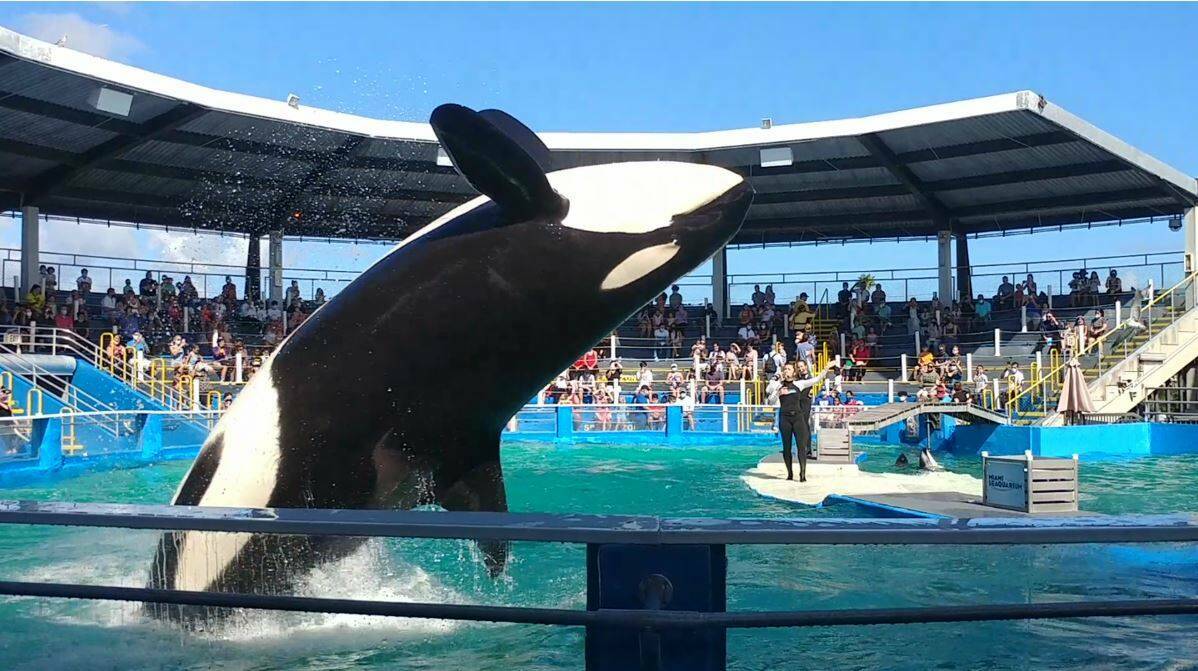The world-famous Southern Resident orca that has lived in captivity since 1970 may finally come home to the Salish Sea.
The Miami Seaquarium announced Thursday that it has formed an agreement with Friends of Lolita, a Florida nonprofit group, to transport the 57-year-old orca back to her native waters. First known as Lolita, then Tokitae and most recently, Sk’aliCh’elh-tenaut, the killer whale was captured in a bloody roundup in 1970. Whale captors used planes, speed boats and explosives to drive the orcas to Whidbey Island’s Penn Cove, where they were trapped in net pens and sold off.
For decades, efforts have been ongoing to free Lolita, who officially retired from performing in 2022 under a USDA license agreement that The Dolphin Company, the Seaquarium’s new owner, signed. In the past, celebrities such as Elton John and Harrison Ford have lent their names to the cause.
According to a statement from the Seaquarium this week, The Dolphin Company’s CEO Eduardo Albor, Friends of Lolita co-founder Pritam Singh and Jim Irsay, the owner and CEO of the NFL’s Indianapolis Colts, are all working together to relocate Lolita, which will happen within the next 18 to 24 months.
The news comes as a huge relief to Howard Garrett, South Whidbey resident and founder of Orca Network. Since 1995, Garrett has steadfastly advocated for the return of the whale, whom he affectionately refers to as Toki.
“I can just imagine her relief, and I’ll share that,” he said. “She’ll be home at last, in her neighborhood, in her familiar water.”
Garrett said Friends of Lolita – the board of which consists of scientists, environmentalists and a Lummi tribal member – have been working with the whale over the past year, helping to improve her health. In 2021, an inspection report from the USDA revealed that she was underfed, her water quality was in poor condition and she was forced to perform head-first jumps while injured.
Recent veterinarian reports, Garrett said, indicate that she’s eating well, moving around and interacting with people, all signs that mean she’s feeling better.
“All the ingredients are now in place to bring her back,” he said, adding that a proposal for her relocation will need to be submitted to federal agencies.
Lummi Nation elders have been leading efforts for her homecoming and have proposed creating a large enclosure somewhere in the Salish Sea for her to live. In the Lummi language, the term for killer whales is qwe ‘lhol mechen, meaning “our relations below the waves.”
The return of Toki is certain to be uncharted waters, which Garrett said will be scientifically interesting to observe. In captivity she has continued to make the same calls used by her family, L pod. Her mother, 95-year-old Ocean Sun, is the oldest female Southern Resident orca. Garrett remains optimistic that Toki will be able to resume communication with her pod and learn how to catch fish again.
“It’s a skill that she’ll remember,” he said. “It’s muscle memory, kind of like riding a bike.”
Concerns that she might not survive once relocated, he said, are unfounded.
“The whole marine park industry has been saying for 50 years, once you’re in captivity you become used to it and you never want to leave. You get fed fish, you get medical care, you get exercise at every show,” he said. “They’ve really persuaded the public and most of the media and the scientific community to believe that it could be dangerous for her to return. But there’s no reason to believe that.”
There’s a possibility that at some point, Lolita will leave her sea pen for open waters. If that happens, the Center for Whale Research will provide monitoring.
“It might be months, a year or more, who knows,” Garret said. “At some point she’ll be able to leave accompanied by a boat and the Center for Whale Research has offered to provide that boat and driver.”



